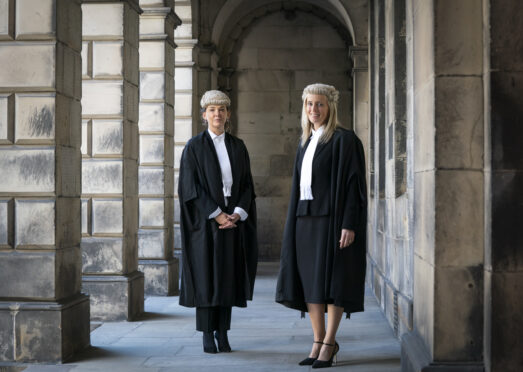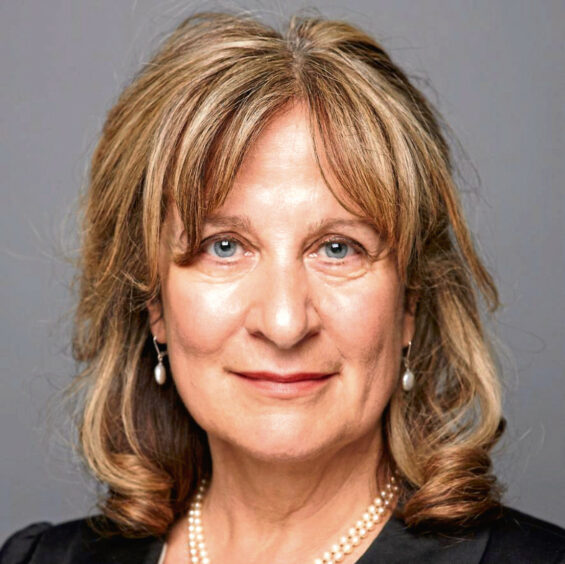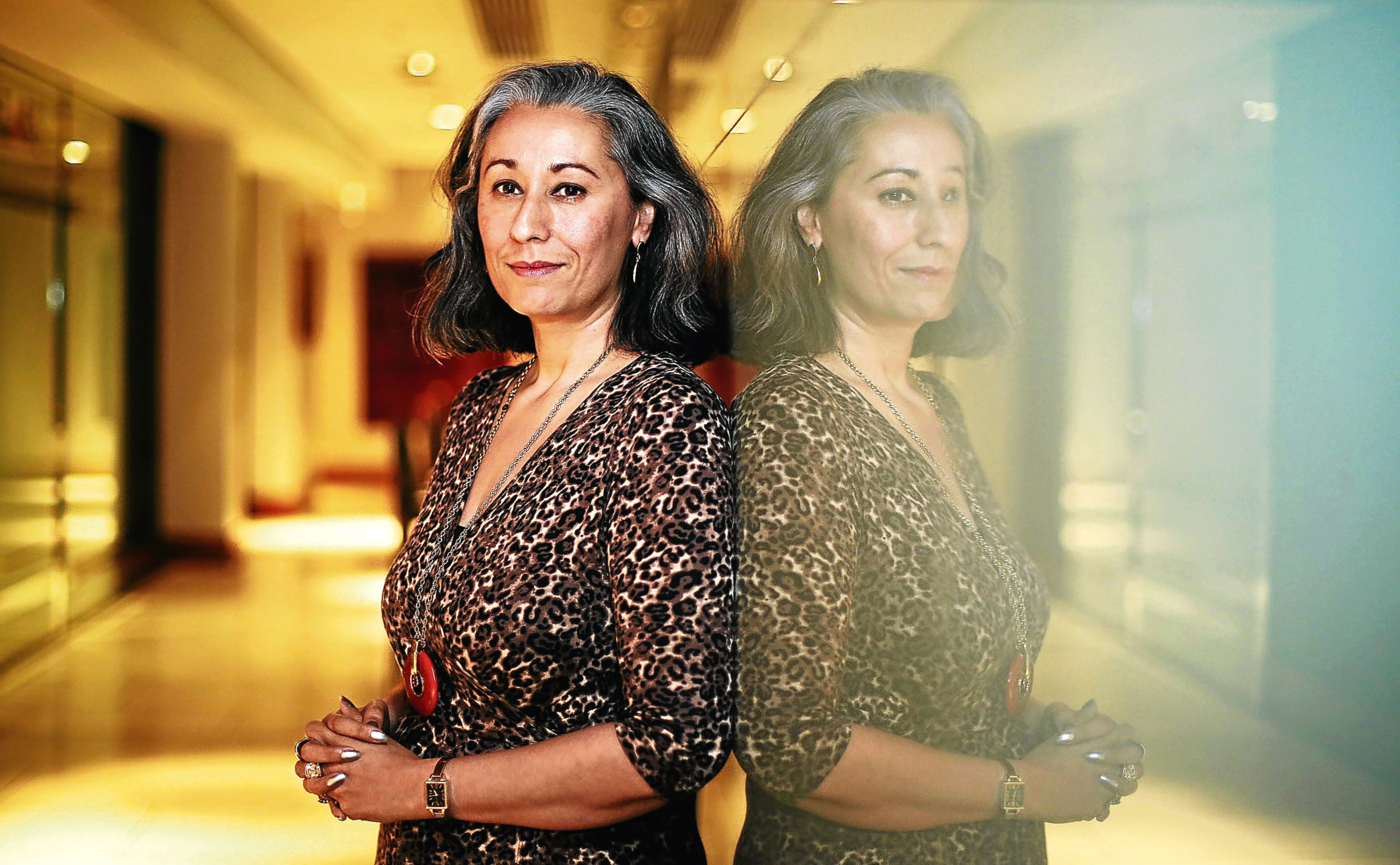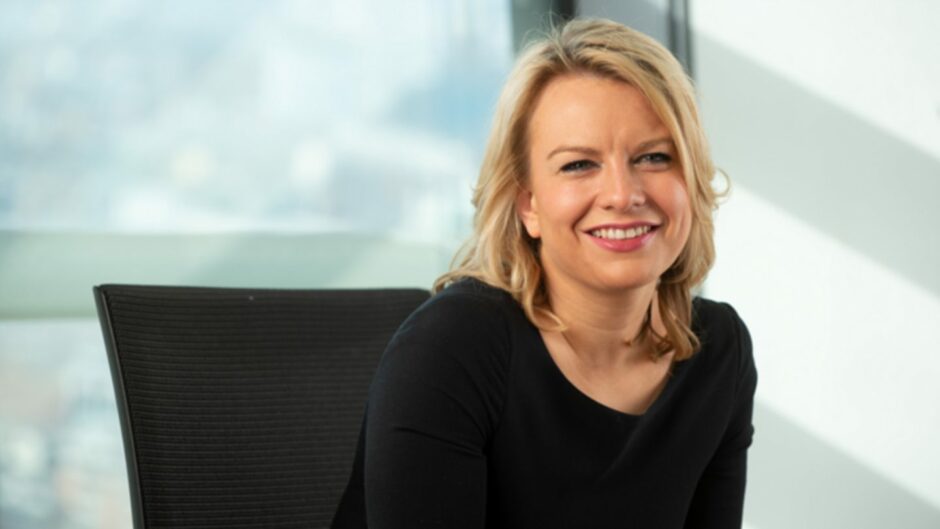
More women must be promoted to senior positions in the criminal justice system to better protect women from domestic abuse and violence, according to Scotland’s Lawyer of the Year.
Naomi Pryde, whose work was hailed last month at the Scottish Legal Awards, believes more can be done to help women achieve their potential and increase their influence to encourage fresh attitudes and understanding at every level of Scotland’s justice system.
Her call was echoed by leading barrister Baroness Helena Kennedy QC, along with former senior police officers and a former member of the Scottish Police Authority, who believe having far more women in senior roles investigating and prosecuting male violence could inspire a sea-change in culture and attitudes.
Scotland’s most senior law officers are both women but observers say the promotion of Lord Advocate Dorothy Bain QC and Solicitor General Ruth Charteris QC should be mirrored at every level of the system. Last year a report by policy and advocacy organisation Engender found the number of women working in the judiciary in Scotland has actually decreased in recent years.
The percentage of female senators of the college of justice fell from 29% in 2017 to 26% in 2020, while the situation for temporary judges was even worse, with 14 men available to provide cover and only three women. The number of female sheriffs fell from 23% three years ago to 22%.
Pryde, who today in The Sunday Post describes some of the obstacles facing women lawyers, said: “Having more women in senior roles in the judiciary could help remove some of the obstacles in the policing and prosecution of gender-based violence.
“There are cases, particularly cases concerning women, where a female perspective may make a difference to the way in which a case is considered and ultimately decided. In order to accurately represent the population and ensure fair access to justice, there requires to be greater gender equality at all levels of the profession. Any barriers that prevented women from reaching the judiciary in the past require to be reviewed and overhauled to ensure greater inclusion. We need to actively encourage female solicitors, legal academics and in-house counsel to apply for judicial appointments.”
Kennedy, who chairs the Working Group on Misogyny and Criminal Justice in Scotland, said: “Active work has to be done to make sure there is a nurturing of female talent and that women are brought onto the bench. I think it would make a qualitative difference to outcomes.”
Kennedy said there were plenty of women capable of becoming sheriffs and judges. “There are brilliant women around and opportunities should be made to bring them into the judiciary. I’ve been making this argument for over 40 years. The world is moving on – the law has to catch up.
“For too long the judiciary was by and large peopled by men of a particular kind of class background and education. We want more variety. That is a much healthier thing.”
Last November, a report by former Lord Advocate Dame Elish Angiolini found evidence of misogyny within Police Scotland and called for a drive to rid the force of a macho culture.
Former Scottish Police Authority member and victims campaigner Moi Ali said she believed macho attitudes within police force inevitably can effect how cases are handled. She said: “It’s extremely frustrating that, despite the damning Dame Elish Angiolini report into the canteen culture, misogyny, racism, discriminatory practices and sexism in the police, and all the warm words that came with it, little has changed. The police and criminal justice system is so male-dominated, until we see women in half the senior roles, I doubt much will change.
“It would be naive not to believe those macho attitude don’t filter down to what happens on the street.
“We have to be far more open to victim-led change. When I hear women saying there’s little point reporting incidents, my heart is broken. We can and must do much better.”
Former Assistant Chief Constable of Police Scotland Angela Wilson said: “Sometimes it takes a watershed moment and dreadful tragedy like the murder of Sarah Everard for everyone to galvanise and push for real change, not just words, but proper action.
“The Dame Elish Angiolini report was another of those moments, one that shone a light on a system that needs to change. And I have to ask, just what has really changed since that report was published, and how long do we have to wait?
“One of the things that needs to change is more women in senior office roles. And it needs to be women who are prepared to speak out rather than women who acquiesce because they are afraid of being sidelined.
“I now work with the Women’s Rape and Sexual Abuse Centre in Dundee and see first hand the diabolically poor conviction rates within a criminal justice system run by people who have absolutely no idea how that affects the lives of those who suffer abuse and violence. We’ve been hearing for years that things are changing for the better. But we still have hundreds of women being raped, abused and murdered. It needs to stop.”
Jackie Malton, one of the Met’s first female detective chief inspectors and the inspiration for Prime Suspect’s DCI Jane Tennison, said: “Every single police chief and force in the UK should be reviewing their response to domestic abuse and violence against women and reflect on the culture that led to what happened in the Sarah Everard case.
“Women now make up 33.4% of officers, but I’d like to see us getting to the point where half our senior officers are women. We’ve come a long way since I was one of the first DCI’s, but we still need to go further.
However, Amanda Millar, a past president of the Law Society of Scotland, pointed out that, in addition to the Lord Advocate and Solicitor General, 55% of all legal practitioners in Scotland are female. She said: “Violence against women is a societal issue that requires engagement and collaboration from all sectors of society.
“In terms of our legislation, it is critical to consider whether Scotland has the right protections in place to tackle violent crimes against women wherever and whenever they happen.
“The current Misogyny and Criminal Justice in Scotland Working Group is due to report by February 2022 and it will be important to consider its findings on possible gaps in existing law and/or whether existing legislation is implemented in such a way women and girls are left without proper protection in law.
“Having women in senior positions in the profession is positive in itself. It promotes consideration of key issues from a more balanced range of perspectives. As the professional body for Scottish solicitors, we do a huge amount of work to achieve equality and diversity.”
Expert: We should learn from Australia
A specialised domestic abuse system pioneered in Victoria, Australia, that brings together a range of different agencies could provide a new template for Scotland.
It uses dedicated teams of trained domestic violence police officers working closely with other specialists such as mental health workers and housing staff, bringing cases to a dedicated family violence court.
Solicitor Tony Bone, a former police chief inspector who worked with Scotland’s groundbreaking Violence Reduction Unit, thinks the system could be successfully introduced in Scotland.
The system involves everything from family doctors to housing staff, police to mental health workers, teachers and child psychologists who ensure families receive support and access to services. Perpetrators face jail terms if they fail to follow court-approved counselling to correct behaviour.
Australia’s family violence courts treat the whole family and integrate criminal and civil court processes rather than duplicating court action, as happens at present in Scotland.
Bone said: “It’s a system I believe the Scottish government should look at closely. There are many advantages over what we currently do here, trying to make domestic abuse fit a criminal charge when the problem is so much bigger than that.
“As a former police officer, I believe the police would welcome change as the system we have is frustrating and so much that is being missed could be picked up by a specialist team aided by specialist multi-agency practitioners.”
Scottish Conservative Shadow Social Justice Secretary Miles Briggs, whose remit includes domestic abuse, is hoping to have Bone address MSPs at either a Holyrood committee or special cross-party summit on the issue.
Briggs said: “We are beginning to understand just how childhood trauma and the lifelong effect of adverse childhood experiences impacts on future mental health, drug taking and behaviour in adulthood, so it is only sensible to consider a whole-family approach to domestic abuse such as the impressive work being undertaken in Australia.
“With the backlog of domestic abuse cases swamping Scottish courts and the increase in violence cases during the pandemic, we must find a new way forward and what is happening in Australia may well provide part of that solution.”
Quotas and targets do little to actually help women reach leadership positions
Solicitor Advocate Naomi Pryde was last month named Lawyer of the Year at the Scottish Legal Awards
I was delighted to be named Scotland’s Lawyer of the Year and wanted to win for the women coming behind me and to show working mums, or those considering having children, that you don’t have to take a step back in your career after having kids if you don’t want to.
In Scotland, it is estimated that fewer than 30% of partners are women and fewer than 30% of solicitor advocates are women. In a profession where 53% of solicitors are women – 68% at junior levels – this inversion at the most senior levels is a matter of concern.
Meanwhile a 2020 report by Engender, Scotland’s feminist policy and advocacy organisation, reported the number of women working in the judiciary in Scotland has decreased.
We need to look how we appoint to the judiciary so it is more inclusive and there is a greater pool of candidates. Solicitors tend to go on to become Sheriffs and Advocates tend to go on to become Court of Session judges.
We need to actively encourage female solicitors, academics and in-house counsel to apply for judicial appointments. There is so much female talent in Scotland. None of this requires positive discrimination or quotas, although there are reserved seats on the Supreme Court for judges from Scotland and Northern Ireland, and a balance is maintained between chancery, common law, and criminal law experience.
All of this is as true of racial diversity, LGBT and disabled people’s inclusion as it is of gender. Many firms have targets about getting more women into leadership, but I would ask firms to look at what they are doing to help women get there.
Women are more likely to undersell themselves for promotion. Women are less likely to ask for pay rises or promotions. Women also tend to take on the bulk of the childcare and household responsibilities, irrespective of whether they are the breadwinner.
Women also tend to do more activities relating to Corporate Social Responsibility and Environmental, Social and Corporate governance, mentoring and pro-bono activities. These business-critical activities are exceptionally valuable and important to a company, but next to impossible to measure on a spreadsheet.
These factors may help explain the gender pay gap, with female lawyers earning 77p for every £1 male colleagues earn.
Statistics provided to me by financial planning and investment firm Tilney state that one in seven women in their early 40s are caring for children, and nearly a third of women in their late 50s are caring for an elderly relative – impacting their ability to earn and save for a pension. 61% of mothers who return to work after children opt for part-time, earning 30% less than women who work full-time. However, I query if some of those women would prefer not to work part-time, but the cost of childcare in the UK offers them little or no alternative.
I would encourage law firms, and indeed all businesses, to look at how they measure performance and reward.
I am passionate about diversity and inclusion because it is so important that my profession is representative of the society it serves. And it is important for the integrity of the judicial system that it properly reflects the society it serves.
Lone officers in Scotland to offer identity check
Police Scotland last night introduced an officer verification process to provide reassurance to any member of the public who may be concerned about whether or not they are being spoken to by a genuine police officer working alone.
The move follows public concern following the murder of Sarah Everard, who was strangled by police officer Wayne Couzens after kidnapping her during a false arrest.
Lone police officers to offer new verification check to members of the public. DCC Will Kerr says the onus is on the police to provide reassurance to people who may feel vulnerable.
Read more ➡️https://t.co/5snBZPLVQa pic.twitter.com/VOjsOylehd
— Police Scotland (@PoliceScotland) October 2, 2021
Police Scotland says on-duty officers operating on their own will now offer to carry out a verification check for anyone they come across who appears to be concerned for their safety. A member of the public can also request that a verification check be done.
The force says that although police officers normally work in pairs in Scotland and it is very rare for a lone police officer to approach a member of the public, there are occasions when this could happen.
The new process, introduced yesterday, will allow for the officer’s personal radio to be put on loudspeaker and for the Police Scotland Control Room to confirm their identity, that they are on duty and the reason the officer is speaking to person.
Deputy Chief Constable Will Kerr said: “The appalling circumstances of Sarah Everard’s murder have deeply affected people and many are now understandably concerned about verifying an officer’s identity.”
Campaign inspired by two young women, killed by violent men and failed by Scotland’s justice
The Sunday Post has this year exposed a series of failures in the investigation and prosecution of fatal attacks on two women – Louise Aitchison and Emma Caldwell.
Police Scotland had to apologise to the mother of Ms Aitchison, 33, who was murdered by partner Darryl Paterson, a serial domestic abuser, just over an hour after she called and begged officers to remove him from their East Kilbride flat.
Paterson had previous convictions for domestic abuse, but police failed to remove traumatised Ms Aitchison to a safe place, allowing him to return minutes after officers left.
His victim’s family were later told by senior police officers Paterson had been wrongly categorised as “borderline dangerous” and at least 18 failures had been identified. Paterson, who had been facing further charges of terrorising a former girlfriend at the time he murdered Ms Aitchison, was jailed for life.
Her MP, Dr Lisa Cameron, said: “It’s deeply concerning that so little appears to have changed since the dreadful circumstances.
“There were many failures by the criminal justice system in this case. One of those was the failure to notify the local authority and support services of Paterson’s past offending towards women so they could react accordingly.
“While MAPPA (multi-agency public protection arrangements) bring together agencies to monitor sex offenders, I believe Scotland could do more to protect victims of domestic abuse and gender violence by developing a similar system to monitor those abusers and red flag concerning behaviours before they lead to tragedies such as Louise’s.”
Meanwhile, a reopened investigation into the murder of Emma Caldwell has entered it’s seventh year. She was killed in 2005 but police shelved the unsolved investigation until the then Lord Advocate ordered the national force to reopen the inquiry when a forgotten suspect was exposed in 2015. New Lord Advocate, Dorothy Bain, has met her mother, Margaret Caldwell, to promise a new urgency in the investigation and prosecution.

Enjoy the convenience of having The Sunday Post delivered as a digital ePaper straight to your smartphone, tablet or computer.
Subscribe for only £5.49 a month and enjoy all the benefits of the printed paper as a digital replica.
Subscribe
 © Mark Mainz
© Mark Mainz
